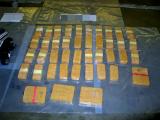A 30 year old man from Anglesey has been remanded in custody after being charged yesterday with attempting to smuggle approximately 100 kilos of heroin, with an estimated street value of £4.5 million, into the UK. He is now due to appear at Dover Magistrates Court on Thursday, 11 September.
On Monday (1 September), a French registered car arrived at Dover's Eastern Docks on a ferry from Dunkerque. It was being driven by a Stephen Paul McNamee, from Holyhead, Wales. During a search of the vehicle, officers from the UK Border Agency (UKBA) discovered the heroin hidden in three suitcases. Two were cases were stowed in the boot of the car and the third in a rear passenger footwell.
The case was passed to HM Revenue & Customs (HMRC) Criminal Investigation officers to continue enquiries, and the driver was interviewed and subsequently charged with attempting to smuggle drugs into the UK. Appearing before Folkestone Magistrates Court earlier today, Mr McNamee withheld his plea.
Bob Gaiger, HM Revenue & Customs spokesman in the South East said: "Vigilance by UKBA officers has prevented these drugs from reaching their destination. UKBA and HMRC will continue to work to the Government's aim of reducing the availability of Class A drugs. Anyone with information about activity they suspect may be linked to drug smuggling should call the HMRC 24-hour Customs hotline on 0800 59 5000."
Carole Upshall, Regional Director South of UKBA said: "This is another excellent result. We will continue to work with our partners in HMRC to tackle the smugglers who attempt to bring goods illegally into the UK. Smugglers are criminals who are only out to make a profit; they do not care about the harm that they cause by smuggling whether its drugs, dangerous counterfeit cigarettes or illegal immigrants."
Malcolm Bragg, HMRC Criminal Investigation Assistant Director, said: "This is an excellent example of the hard work and dedication of HMRC Criminal Investigation staff who, along with our colleagues in UKBA, are working diligently to stop drugs entering the UK, we aim to protect society from this activity wherever we detect it."


